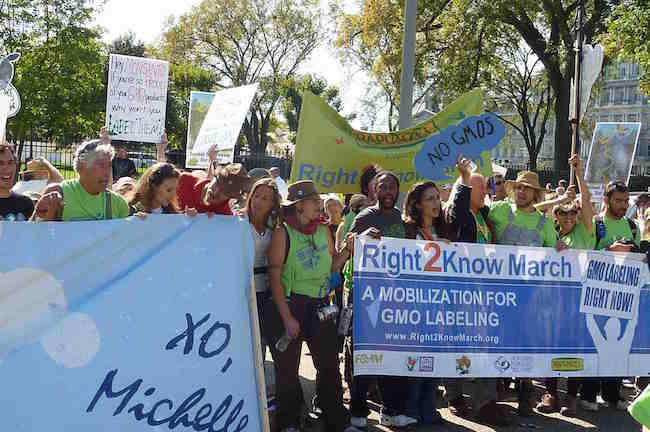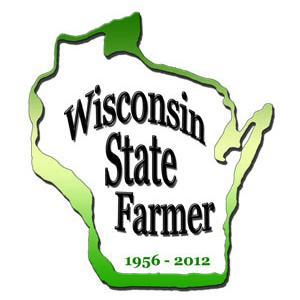
All Forms of Genetic Engineering Must Require Labels
(Please note: Even though I have tried to simplify it as much as I could, today’s email is more technical than all of my other weekly emails. However, GMO-labeling is an extremely important issue and one that organic food companies have spent tens of millions of dollars on.)
As the USDA prepares to roll out its GMO-labeling law, which goes into effect in 2018, it is seeking input from stakeholders and has posed 30 questions regarding key issues of this bill.
This input will provide valuable guidance as the agency writes a formal draft of the law, which the public will be able to comment on as well.
Michael Hansen, Ph.D., Senior Scientist at Consumers Union and arguably the preeminent expert in our industry when it comes to GMOs, genetics and all things labeling, released Consumers Union’s official comments on Friday, and I believe its key points below are the ones that organic advocates should focus on when submitting their own opinions to the USDA.
* DEFINING THE TERM “BIOENGINEERING” Last year, on July 29, 2016, Congress passed P.L. 114-216, the National Bioengineered Food Disclosure Standard, which requires disclosure if a food product contains bioengineered (genetically-engineered) materials.
As you can imagine, there was a lot of debate about what “bioengineered” exactly means.
In order to close a possible loophole where a food company could say that its products are not “bioengineered” but “genetically-modified” and, therefore, should not be labeled, the USDA should recognize a limited number of alternative terms that all mean the same thing.
More specifically, “modern biotechnology,” “genetic engineering,” “GE,” “genetic modification,” “genetically modified organism,” and “GMO” should be interchangeable with “bioengineering.” Other governmental agencies already recognize and use these terms.
* GENETIC ENGINEERING DOES NOT CREATE MODIFICATIONS FOUND IN NATURE Under Section 291(1)(B) of the law, it references “modifications found in nature.”
Products of bioengineering or modern biotechnology, as defined by the FDA, the National Organic Standards Board and others, should not be considered “modifications found in nature.”
Why?
Because the genetic sequences that create bioengineered food (genetically-engineered food) are made in a laboratory, are unique and are not found in nature.
This means that all food produced using gene-editing techniques, such as CRISPR-Cas9, must be subject to labeling.
DETECTION IS NOT ESSENTIAL Some food companies may say that if genetic material from a highly refined, bioengineered product (soy oil, for example) is not detectable, then it is not there and shouldn’t be labeled.
This is flawed, and the courts have agreed.
It just means that today’s technology cannot detect it, and technology that comes out in the next few years could very well detect it.
As a result, these highly refined products should be labeled. It was also the clear intent of Congress to cover highly refined products.
GMO THRESHOLD SHOULD BE 0.9% Consistent with the European Union and many countries throughout the world, the threshold for the amount of genetically-engineered material in a food should be 0.9%.
Using this globally accepted threshold will facilitate international trade.
GMO-SUPPLEMENTS MUST BE LABELED The USDA must not exclude dietary supplements from labeling requirements since dietary supplements are generally considered foods by the FDA, are widely consumed and may be bioengineered.
(As a side note, I hear that one of the real problem areas for Whole Foods – in its plan to label all GMOs by 2018 – has been supplements. GMOs are so ubiquitous in supplements that finding Non-GMO sources of ingredients, such as maltodextrin (corn), is a huge issue.)
While there are plenty of other areas to comment on, the ones above, according to Michael Hansen, are the most crucial.
And I agree.
Despite the fact that using QR codes instead of on-packaging labels is discriminatory (not everyone can afford or uses a smartphone), they have been approved by Congress in this GMO-labeling law.
Yet, it is best to discuss how QR codes should be administered once we see a draft of the law and after Deloitte’s digital disclosure study has been submitted to the USDA by July 28th.
What’s important now is to make sure that the USDA includes all gene-editing technologies in this labeling law.
Feel free to use any or all of the points above when submitting your comments to the USDA. If you’d like to see Consumers Union’s full comments, they are posted HERE.
It is essential that the USDA hears from as many of us as possible because the other side will be working feverishly to slip in as many loopholes as they can.
Comments should be submitted today to: GMOlabeling@ams.usda.gov
If you can’t make the deadline today, please submit them as soon as possible.
Thank you so much for your concern.
https://www.ams.usda.gov/rules-regulations/gmo-questions
 |
Have a great day! 
Max Goldberg, Founder |
Quick Hits
* So much for Trump’s promise to drain the swamp. He just nominated Steve Censky to be the Deputy Secretary at the USDA, and it just so happens that Steve Censky has been the CEO of the American Soybean Association for the last 21 years.
* You can only imagine how tight he is with Monsanto, Syngenta, DuPont and the rest. This is an unmitigated disaster for organic.
* Additionally, the USDA just overturned the National Organic Standards Board’s (NOSB) recommendation to not renew three conventional ingredients in organic products — inulin enriched oligofructose, whey protein concentrate, and Turkish bay leaves — that were set to expire under the Sunset Rule.
* It is another sign early in the Trump administration that the USDA has its own agenda when dealing with organic and is ignoring the suggestions of the NOSB. Please read Cornucopia’s take on the matter for more analysis. Needless to say, this is deeply alarming.
* One of the most well-known chefs in the organic community, Matthew Kenney, has run into more legal issues. The Miami Herald gives an in-depth look at what is going on with his plant-based empire.
Weekly News Summaries

Influential U.S. Senator Thinks the USDA's Organic Program has Become Dysfunctional
By Peter Whoriskey
As Congress prepares for the Farm Bill, Senator Pat Roberts (R-KS) told a subcommittee that "uncertainty and dysfunction have overtaken the National Organic Standards Board and the regulations associated with the National Organic Program.”

Is Organic in Big Trouble at the USDA?
By Alan Lewis
Natural Grocers' Alan Lewis paid a visit to Capitol Hill recently, and it appears that the National Organic Standards Board is due for major changes. Ominous changes.

Ex-Amazon Executive Discusses Operating Changes We Can Expect to See at Whole Foods
By Natalie Walters
Fascinating read. What a former Amazon executive, who recommended that the company buy Whole Foods back in 2013, predicts what the online giant will do in the future.

Germany Has Set a Goal to be at 20% Organic Farmland
Currently, 7.5% of farmland in Germany is organic, but the country sees the scarcity of land available for organic farming as a threat to its long-term development.

Trump's EPA to Rule on Glyphosate Causing Cancer
By Chase Purdy
Will the EPA and Scott Pruitt block glyphosate from being renewed, even though there is strong evidence that it causes cancer? Very unlikely.

How the Biotech Industry Intimidates and Influences the Media
By Paul Thacker
An investigation into the tricks and tactics that GMO companies use to control and intimidate the media.

Organic Valley Sends Young Farmers to the UK on an Exchange Program
Very cool. Organic Valley has announced a program where it will be sending young farmers, ages 16 to 35, to the United Kingdom to learn organic farming practices.

Whole Kids Foundation launches Free App to Promote Organic Education
By Melissa De Leon
In conjunction with UNFI, the Whole Kids Foundation, a non-profit arm of Whole Foods, has launched a free app to help to educate kids on organic farming.

Toronto's Organic Garage on Staying Ahead in Retailing
By Dan Orlando
An inspiring look at how the Canadian supermarket chain maintains its competitive edge -- by offering a very heavy selection of organic.

How Organic Food Can Rescue Small Towns
By Joe Hasler
A look at how struggling towns are turning to organic and sustainable food ventures to reverse their economic fortunes.
The material in this newsletter is copyrighted and may be reprinted by permission only. All requests must be in writing. Please use our contact form to request republication rights.
Newsletter Archive
Quick Hits
* So much for Trump’s promise to drain the swamp. He just nominated Steve Censky to be the Deputy Secretary at the USDA, and it just so happens that Steve Censky has been the CEO of the American Soybean Association for the last 21 years.
* You can only imagine how tight he is with Monsanto, Syngenta, DuPont and the rest. This is an unmitigated disaster for organic.
* Additionally, the USDA just overturned the National Organic Standards Board’s (NOSB) recommendation to not renew three conventional ingredients in organic products — inulin enriched oligofructose, whey protein concentrate, and Turkish bay leaves — that were set to expire under the Sunset Rule.
* It is another sign early in the Trump administration that the USDA has its own agenda when dealing with organic and is ignoring the suggestions of the NOSB. Please read Cornucopia’s take on the matter for more analysis. Needless to say, this is deeply alarming.
* One of the most well-known chefs in the organic community, Matthew Kenney, has run into more legal issues. The Miami Herald gives an in-depth look at what is going on with his plant-based empire.
